Look to Scott Walker as G.O.P. nominee
Last September, unexplainable lane closures leading up to the George Washington Bridge in Fort Lee, N.J. began the scandal which is slowly diminishing Governor Chris Christie's chances to become the Republican Party's candidate for president in 2016. Director of Interstate Capital Projects David Wildstein (who oversaw the lane closures at the Port Authority) stated recently that Christie had knowledge that the lane closures were going to occur. This, coupled with news that the U.S. Attorney's office in New Jersey is including Christie's 2012 re-election campaign in its investigation, signals that the embattled Governor will not be granted a reprieve from bad publicity anytime soon.
With Christie's character coming into question and his presidential hopes fading, the question then becomes: who will be the next front runner for the Republican nomination in 2016? Although candidates have not begun to officially announce their plans to run, there is a group of Republicans who have been attempting to increase their visibility as though they are preparing for a presidential race. Only one, though, can eventually take the coveted nomination.
I believe Wisconsin Governor Scott Walker will end up being the candidate for the Republican Party in 2016. Like Governor Jeb Bush and Sen. Marco Rubio, he has a more progressive agenda, unlike Mitt Romney who lost appeal due to his contradictory rhetoric. However, both Bush and Rubio have alienated themselves from members of their party.
Bush, a proud centrist, has angered more conservative Republicans by accusing them of being too negative and supporting immigration reform. Rubio drew the ire of conservative Republicans when he co-authored the immigration bill of 2013 and released his anti-poverty agenda which had too much government intervention for Tea Party standards. Unlike Bush and Rubio, Walker has not alienated himself from his party with his policies or his talking points.
Walker has been praised for being clear and consistent. In this way he differs from Sen. Rand Paul, whose ideology is an amalgam of Libertarian and Republican views. Specifically, Paul's perspective on foreign policy is derived from a non-interventionist, libertarian point of view, while his perspective on the economy and social issues line up with the mainstream Republican ideology. Walker has garnered the support of Republicans, Independents and some Democrats in his state with his adherence to his classic conservative views, which he presents in a positive manner.
Walker's recently published book, Unintimidated: A Governor's Story and a Nation's Challenge, is further testament to his consistency. Rather than avoiding talking about the infamous collective bargaining agreement of 2011 which limited the collective bargaining rights for most of Wisconsin's public unions, Walker chose to tackle the issue head-on in the book. In it, he attempts to explain his perspective and why he believes the measure was the right course of action for his debt-ridden state. His willingness to confront the issue publicly shows voters that he is honest and separates him from other candidates who might choose to change their positions on controversial topics rather than be consistent.
Additionally, Walker seems to be employing a similar strategy to Sen. Ted Cruz. The two men want voters to see them as straight-talking, down-to-earth leaders who represent the people and are capable of galvanizing the Republican Party. However, Walker's principled, straightforward approach is likely to be more attractive to voters than Cruz's rather grandiose and hyperbolic manner of speaking. Both engaged the American left in contentious battles.
Cruz lost his battle when he embarrassed himself and his party while leading the effort to shut down the federal government in October. Walker won his battle with class and proceeded to win his recall election.
Since the election of President Barack Obama in 2008, the Republican Party has struggled to regain the credibility it lost during the unsuccessful tenure of President George W. Bush. After failing to win the Presidency again in 2012, the party seems to have realized that to restore the image it acquired under President Ronald Reagan, it will need to drastically change its approach. Over the past several months, all of the previously mentioned politicians have attempted to introduce themselves as leaders who will shatter the existing stereotype that Republicans are only motivated by money and political gains. Scott Walker will be chosen as the nominee for the Republican Party in 2016 because his genuine persona and bold, conservative ideology makes him the ideal candidate to revamp the Party and excite the Republican voting base.



Please note All comments are eligible for publication in The Justice.